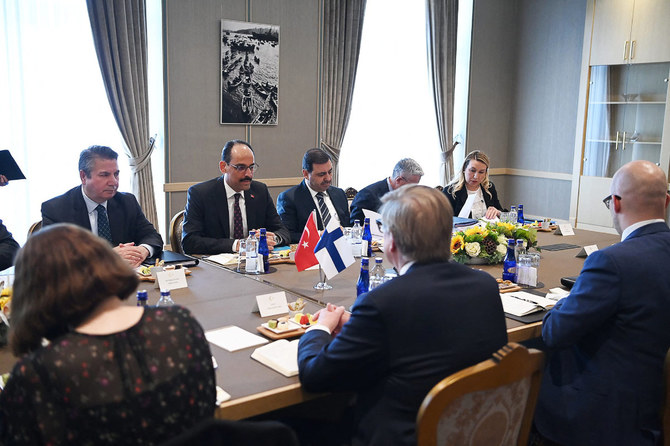Turkey’s crucial week with Euro-Atlantic community

https://arab.news/72ats
As this week’s NATO summit in Madrid approaches, the alliance faces another tough test. Turkey, however, faces an even tougher one. Ankara has to decide whether it should insist on using its veto to prevent the admission of two Nordic countries — Sweden and Finland — to NATO.
This question did not come on to the agenda out of the blue. Preparations for Sweden and Finland’s admission to NATO have been discussed for months. What made this a pressing issue was the Russian invasion of Ukraine in February. Finland, which itself has a territorial dispute with Russia, felt threatened and debate in the Finnish public opinion sphere has become lively. The number of Finns who were ambivalent for years on whether to unnecessarily antagonize Russia dwindled. According to a poll, those who supported the country joining NATO rose from 53 percent in February to 62 percent in March and 76 percent in May. This steep rise is, of course, due to the growing Russian threat.
Sweden is less exposed to Russia. This threat is only across the Baltic Sea, but whether close or distant, a threat is always a threat. Neutrality was almost part of the Swedish people’s way of life. In March, Prime Minister Magdalena Andersson stated that NATO membership was likely to destabilize the power balance in the Baltic Sea. Her thoughts later evolved in the direction of not excluding her country from NATO membership. In mid-April, she said Sweden might join NATO if Finland did so too. Now, both Nordic countries are clearly in favor of joining the alliance.
This evolution in the minds of the rulers of Sweden and Finland is also related to developments in the battle between Russia and Ukraine. The risks have now become more concrete and President Vladimir Putin’s statements more threatening. As a result, while 47 percent of Swedes supported joining NATO in March this year, this rose to 53 percent in April. So, the majority of the Swedish people are now in favor. This is all the more important because of the Swedish parliamentary elections scheduled for September.
While these changes were taking place in Sweden and Finland, there were other changes brewing in Turkey, another NATO flank country. Ankara was regularly raising its unease with the Swedish and Finnish governments’ attitude regarding anti-Turkey activities in these countries. Similar activities were also witnessed in Germany, Holland and France, but Turkey does not hold a veto card against them.
Veto on Sweden and Finland joining NATO offers a good opportunity for Ankara to raise its voice on a crucial issue.
Yasar Yakis
Turkey’s formal objection to Sweden and Finland’s accession to NATO was not raised until recently. Ankara may have just woken up to the reality of using their membership bids as an opportunity to withhold its consent. It offers a good opportunity for Turkey to raise its voice on a crucial issue and it now wants to capitalize on this.
To what extent could Turkey resist the pressure that will come from influential NATO countries such as the US, UK, Germany and France? Ankara holds some major cards in its hand. The most important one is its entitlement to oppose the admission of any new member to NATO. It may look to be a rock-solid right, but for countries like Turkey, which needs equivalent concessions from the other side, it may not be put forward as a strong argument.
Turkey is in a relatively strong position in the Ukrainian crisis. It is one of the few countries that has leverage on both Russia and Ukraine. It may be sitting on the fence because it is already alienated in NATO, as it is being excluded from the alliance’s most advanced fighter jet program, the F-35. Many congressmen in the US consider Turkey to be a liability rather than an asset. It is subject to US sanctions under the Countering America’s Adversaries Through Sanctions Act. However, at the present critical juncture, losing Turkey to the Russian side would be detrimental to the Euro-Atlantic community.
NATO has a good tradition of solving problems behind closed doors and agreeing on a gray formulation that satisfies all sides.
The US is always the most important player in NATO. It will probably put its weight into this difficult equation. But Turkey has a strong card to play against the US in Syria. It wants to persuade Washington that the support provided by the US to the Kurdish cause is not a very strong case. Ankara has demonstrated on more than one occasion that the Syrian Kurdish PYD party, which is strongly supported and supplied by Washington, is nothing but the continuation on Syrian territory of the PKK, which the US has designated as a terrorist organization.
But two plus two does not always equal four in international relations.
• Yasar Yakis is a former foreign minister of Turkey and founding member of the ruling AK Party. Twitter: @yakis_yasar









































